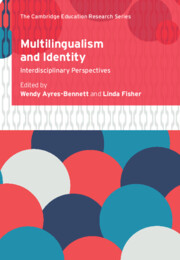Book contents
- Multilingualism and Identity
- Multilingualism and Identity
- Copyright page
- Contents
- Figures
- Tables
- Contributors
- 1 Towards Interdisciplinarity in Multilingual Identity Research
- Part I Situated Multilingualism and Identity
- 2 ‘Every Line Is a Lie’
- 3 Beyond ‘Narrating the Nation’
- 4 Metrolingual Practices and Distributed Identities
- 5 Migrants’ Identities in Multilingual Cities
- 6 Indexicalities in the Multilingual City
- 7 Multilingualism and Identity in Ningbo, China
- Part II Multilingual Identity Practices
- Part III Multilingual Identity and Investment
- References
- Index
4 - Metrolingual Practices and Distributed Identities
People, Places, Things and Languages
from Part I - Situated Multilingualism and Identity
Published online by Cambridge University Press: 22 July 2022
- Multilingualism and Identity
- Multilingualism and Identity
- Copyright page
- Contents
- Figures
- Tables
- Contributors
- 1 Towards Interdisciplinarity in Multilingual Identity Research
- Part I Situated Multilingualism and Identity
- 2 ‘Every Line Is a Lie’
- 3 Beyond ‘Narrating the Nation’
- 4 Metrolingual Practices and Distributed Identities
- 5 Migrants’ Identities in Multilingual Cities
- 6 Indexicalities in the Multilingual City
- 7 Multilingualism and Identity in Ningbo, China
- Part II Multilingual Identity Practices
- Part III Multilingual Identity and Investment
- References
- Index
Summary
Drawing on various distributive frameworks – distributed cognition, distributed agency, distributed language – this paper makes a case for understanding identity along similar lines. While poststructuralist approaches to identity usefully undermined monological cognitive approaches to identity (where identity is a characteristic of the individual) – emphasizing instead the discursive construction of subjectivity as multiple, conflictual and flexible – many failed by and large to escape the constrictions of methodological individualism, or to account adequately for non-discursive factors, the place of agency or the material world. Distributive frameworks, by contrast, seek to break down the barriers between inside and outside, between humans and their surrounds, between language and context. From this point of view, language, cognition and agency are not solely properties of individuals bur rather operate through larger networks, assemblages or entanglements. In this paper we draw on recent data from our ten-year metrolingualism project to explore ways in which identity may be understood as a relational quality of an assemblage of people, places, things and linguistic resources.
- Type
- Chapter
- Information
- Multilingualism and IdentityInterdisciplinary Perspectives, pp. 69 - 90Publisher: Cambridge University PressPrint publication year: 2022
- 3
- Cited by

